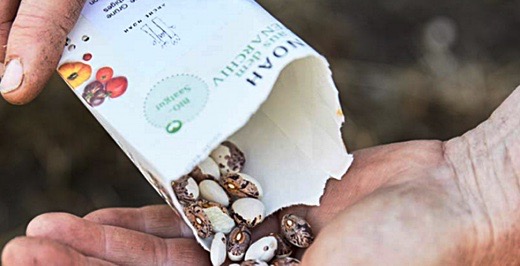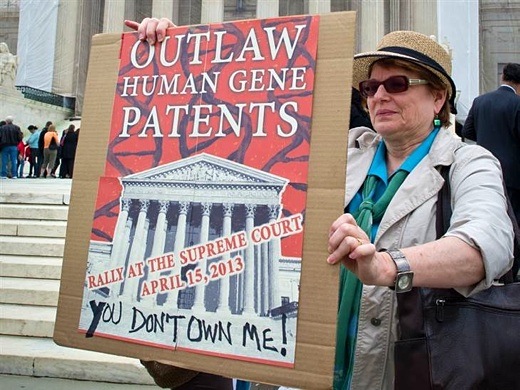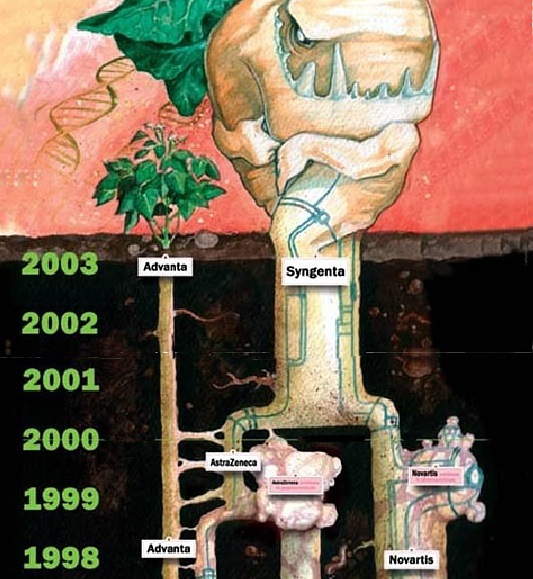SUBHEAD: New Open Source License fights the patenting of seeds through "copyleft" license.
By David Bollier on 3 May 2017 for Billier.org -
(http://www.bollier.org/blog/new-open-source-license-fights-enclosure-seeds)

Image above: A packet of newly developed seeds once opened becomes an agreement of "copyleft" not to patent the seeds within. From original article.
As more and more plant varieties have become privatized through patents, and as large corporations have bought up smaller seed breeders, a dangerous consolidation has occurred.
The genetic diversity of agricultural crops has shrunk, making crops more vulnerable to disease and our food supply more insecure. Meanwhile, farmers and the public have become more dependent on a few large agrochemical companies.
In short, seed patents have become a tool for privatizing seed from the pool of open and commonly owned plant genetic resources: an insidious enclosure of seed commons.
This scenario is eerily similar to the consolidation of software for personal computers some twenty years ago. Microsoft used its market dominance to incorporate all sorts of software programs into its Windows operating system, a strategy sometimes referred to as “embrace, extend and extinguish.”
As Microsoft exploited its de facto monopoly over common software systems, programs for word-processing, spreadsheets and other functions began to go out of business.
But just as open source software served as a powerful antidote to proprietary software, so a group of academics, activists and plant breeders in Germany has now pioneered a similar antidote to seed patents: an open source license.
The Open Source Seed license, recently released by a group called OpenSourceSeeds, is trying to “make seeds a common good again.” The license amounts to a form of “copyleft” for new plant varieties, enabling anyone to use the licensed seeds for free. Like the General Public License for free software, the seed license has one serious requirement: any seeds that are used, modified or sold must be passed along to others without any legal restrictions.
This is the “share-alike” principle, which is also used by Creative Commons licenses. Its purpose is to prevent the privatization of a common resource by requiring any user to share it freely and forever.
The Open Source Seed license directs any users:
OpenSourceSeeds hopes that plant breeders will use its license to protect access to new crop varieties, eventually producing a new sector of open source seed production. The group’s website invites breeders and seed distributors to register on its database so that buyers can discover where they can purchase open source seeds.
OpenSourceSeeds explains that its agenda is to promote food security through seed diversity; restore crop seeds as a common good; and assure free access to seed (meaning, no legal restrictions on use; seeds can still be sold).
It envisions a more ecological approach to farming rather than the monoculture crops of industrial agriculture. It wants to develop and promote a diversity of crop types, and promote varieties with ecological potential for niche locations and landscapes. All of these goals require a non-private, commonly owned seed sector where private profit is not the primary goal.
If you’d like to explore this topic further, here is an informative background essay, “Liberating Seeds with an Open Source Seed License,” by Johannes Kotschi and Klaus Rapf, of AGRECOL, the Association for AgriCulture and Ecology, in Germany.
Bravo, OpenSourceSeeds, for this ingenious initiative! May your new license and ethic of seed stewardship produce many bountiful harvests in the future.
Check out the Open Source Seed Initiative in the US, too. It is quite active in advancing the same goals as OpenSourceSeeds and its license.
.
By David Bollier on 3 May 2017 for Billier.org -
(http://www.bollier.org/blog/new-open-source-license-fights-enclosure-seeds)

Image above: A packet of newly developed seeds once opened becomes an agreement of "copyleft" not to patent the seeds within. From original article.
As more and more plant varieties have become privatized through patents, and as large corporations have bought up smaller seed breeders, a dangerous consolidation has occurred.
The genetic diversity of agricultural crops has shrunk, making crops more vulnerable to disease and our food supply more insecure. Meanwhile, farmers and the public have become more dependent on a few large agrochemical companies.
In short, seed patents have become a tool for privatizing seed from the pool of open and commonly owned plant genetic resources: an insidious enclosure of seed commons.
This scenario is eerily similar to the consolidation of software for personal computers some twenty years ago. Microsoft used its market dominance to incorporate all sorts of software programs into its Windows operating system, a strategy sometimes referred to as “embrace, extend and extinguish.”
As Microsoft exploited its de facto monopoly over common software systems, programs for word-processing, spreadsheets and other functions began to go out of business.
But just as open source software served as a powerful antidote to proprietary software, so a group of academics, activists and plant breeders in Germany has now pioneered a similar antidote to seed patents: an open source license.
The Open Source Seed license, recently released by a group called OpenSourceSeeds, is trying to “make seeds a common good again.” The license amounts to a form of “copyleft” for new plant varieties, enabling anyone to use the licensed seeds for free. Like the General Public License for free software, the seed license has one serious requirement: any seeds that are used, modified or sold must be passed along to others without any legal restrictions.
This is the “share-alike” principle, which is also used by Creative Commons licenses. Its purpose is to prevent the privatization of a common resource by requiring any user to share it freely and forever.
The Open Source Seed license directs any users:
You will in particular refrain from making any claim to plant variety rights, patent rights or any other statutorily possible exclusivity rights of the seeds or their propagation and enhancements.The open source seed license was released on April 25 in Berlin by the Association for AgriCulture and Ecology (AGRECOL e.V) and the German NGO Forum on Environment and Development. They also released the first two open-sourced seeds, the tomato “Sunviva” (Lycopersicon esculentum L.) and the spring/summer wheat known as “Convento C.” (For more on this event, see this story by Intellectual Property Watch.)
Simultaneously, the licensing provisions oblige you, in turn, to subject any seeds or enhancements of the seeds obtained from the present seeds to these licensing provisions, and only to pass them on to third parties on these conditions (“copyleft”). Should you infringe the obligations arising from this licence agreement, you will forfeit your rights of use of the seeds or any seeds or enhancements obtained therefrom.
By acquiring or opening the packet of these plant seeds you accept, by way of an agreement, the provisions of a licence agreement where no costs shall be incurred to you. You especially undertake not to limit the use of these seeds and their enhancements, for instance by making a claim to plant variety rights or patent rights on the seeds’ components.
You shall pass on the seeds, and propagations obtained therefrom, to third parties only on the terms and conditions of this licence. You will find the exact licensing provisions at www.opensourceseeds.org/licence. If you do not wish to accept these provisions, you need to refrain from acquiring and using these seeds.
OpenSourceSeeds hopes that plant breeders will use its license to protect access to new crop varieties, eventually producing a new sector of open source seed production. The group’s website invites breeders and seed distributors to register on its database so that buyers can discover where they can purchase open source seeds.
OpenSourceSeeds explains that its agenda is to promote food security through seed diversity; restore crop seeds as a common good; and assure free access to seed (meaning, no legal restrictions on use; seeds can still be sold).
It envisions a more ecological approach to farming rather than the monoculture crops of industrial agriculture. It wants to develop and promote a diversity of crop types, and promote varieties with ecological potential for niche locations and landscapes. All of these goals require a non-private, commonly owned seed sector where private profit is not the primary goal.
If you’d like to explore this topic further, here is an informative background essay, “Liberating Seeds with an Open Source Seed License,” by Johannes Kotschi and Klaus Rapf, of AGRECOL, the Association for AgriCulture and Ecology, in Germany.
Bravo, OpenSourceSeeds, for this ingenious initiative! May your new license and ethic of seed stewardship produce many bountiful harvests in the future.
Check out the Open Source Seed Initiative in the US, too. It is quite active in advancing the same goals as OpenSourceSeeds and its license.
.

